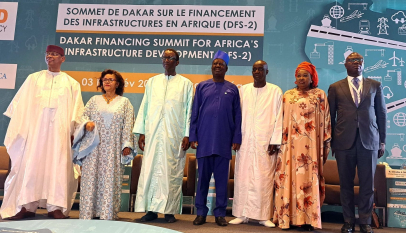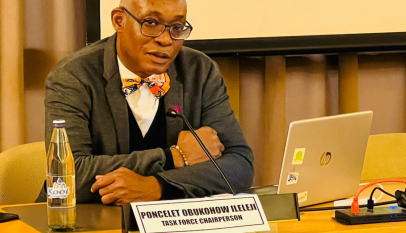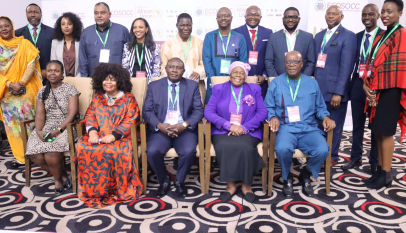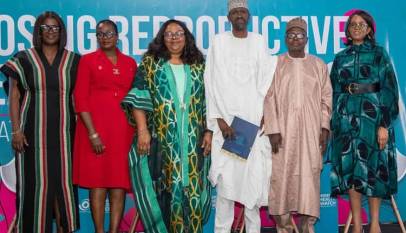INTERVIEW | What Africa must do to make the AfCFTA work – Trudi Hartzenberg
Trudi Hartzenberg is the executive director of the Stellenbosch, South Africa-based Trade Law Centre (TRALAC), focused on improving capacity in trade governance in Africa. Hartzenberg, who currently serves on the World Trade Organization (WTO) Chairs Advisory Committee is also a member of the Committee for Development Policy (CDP), a subsidiary of the United Nations Economic and Social Council (ECOSOC).
In this exhaustive interview in the aftermath of the January 1st Launch of Trading under the African Continental Free Trade Area (AfCFTA), Hartzenberg speaks on the biggest implementation challenges the continent must address, such as the dearth of both hard and soft infrastructure, as well as the need to ensure young people, women, and SMEs are able to maximally benefit from the opportunities presented by the CFTA

Newspage: What does the January 1st Launch of Trading under the AfCFTA mean for Africa’s decades long journey towards regional integration?
Hartzenberg: Even as negotiations on tariff concessions and the rules of origin for some products are yet to be completed, hence not all trade under the AfCFTA can begin, the launch of some trade under the AfCFTA on 1 January 2021 does have significance. The start of trade demonstrates the political will to start the implementation of the AfCFTA. However, the road to full trade among all State Parties under this regime will be paved with many challenges.
Most importantly, the negotiations on tariffs and rules of origin must be completed. Trade has started on 1 January based on the tariff offers that member states have made. This is the opening round in the negotiations. With reciprocal negotiations, it may well be that further concessions will be made.
Ratification of the AfCFTA is an important milestone, but that is actually when the work starts at national level. Changes to the tariff book, introducing the new AfCFTA certificates (rules of origin, standards etc) will have to be done. It is very important to provide information to the private sector and consumers. Transparency about the new rules for trade under the AfCFTA is also essential; tariffs, rules of origin, transit arrangements, standards and the details for all relevant rules must be in the public domain and accessible to all via a website, with details of how to apply for the requisite certificates, where to apply and how long the application process takes. Hopefully, these processes and certificates will be digitalized.
Logically, given the diversity among the Member States that have ratified the Agreement, this could take quite some time. It is also important that all officials involved in the border management functions and those involved in the domestic implementation processes (receiving applications for rules of origin certificates etc) are trained to understand their role and the new instruments.
Newspage: How important is digitalizing processes and instruments under the AfCFTA such as tariffs, certificates of origin and standards?
Hartzenberg: Digitalization is such an important step. During the pandemic, we saw how some countries adopted digitization, issuing digital certificates of origin and so on. Covid-19 actually pushed us towards that process of digitalization. This is an opportunity for us to take the digitalization process forward; it’s going to be beneficial to us all if we legitimize digitized instruments such as e-certificates of origin, standards and so on. In that case, it’s really important that if one country issues a digital certificate, the destination country accepts that certificate as legitimate. So, there is really a need for reciprocity among State Parties.
Otherwise, we may find ourselves in a situation where consignment of goods arriving with digitized instruments at border posts being rejected by customs officers and that’s why I also think there is need to train all the officials working across the trade facilitation value chain – customs officers, officers managing standards and immigration officials, amongst other functions represented at the border posts. They need training on the new legal instruments, the new certificates, the new processes and so on. So, lots of work have to be done to foster effective inter-agency cooperation and very functional border management systems.
Newspage: Thus far, 54 out of 55 AU Member States have signed the AfCFTA Agreement with Eritrea being the only exception. However, only around 33 countries have ratified it yet. How big a challenge does this constitute to the new Free Trade Area (FTA)?
Hartzenberg: There are still a number of countries that are yet to complete the domestic approval processes as required by their Constitutions, and then deposit their instruments of ratification with the African Union Commission. These are very important processes and they are then followed by the domestic implementation processes as I described above.
The situation of Eritrea is really remarkable because they have a lot of domestic challenges. Yet, they have indicated that they would at some stage sign the Agreement. Although signing an agreement such as this brings no legal obligations, it is a statement of commitment to participate in the process. So, the fact that we are now missing only one country is still a good track record; it shows a high level of commitment among AU Member States – it is a good starting point!
Then of course there is the ratification, which is an international process whereby a sovereign state indicate that it gives its consent to be bound by an agreement. This is a really important step to keep in mind. Currently, about 36 countries have ratified the Agreement, the numbers keep growing. We can definitely see that Covid-19 slowed down the process last year but towards the end of the year, around October–November, we saw a new wave of enthusiasm in the form of more ratifications.
Now, that is a big step but equally important is what then happened domestically after the ratification because that is when we start implementing. So, there will be a new tariff book which specifies the applicable import duties when importing products, there is also the need to publish legal instruments such as rules of origin, standard certificates, transit certificates and so on. These are necessary for the private sector to be able to comply with the requirements for export under the new agreement.
This is why I am emphasizing that we should put all of these instruments in easily accessible digital formats which will reduce the transaction costs for especially smaller firms. For the smaller firms, asking somebody to go to an office to fill-in a paper application form is a waste of time and resources. If they can simply download the application form, attach all the necessary documentation, and email or submit it via a web portal, it saves a lot of transaction costs. So, I think digitalization is so important especially for smaller firms because it reduces transaction costs.
At the point we are now, implementation is at different levels because obviously, it was not all trade under the AfCFTA that started on the 1st of January; some countries are yet to publish their tariff offers while negotiations, especially the second phase, have also not been completed. That’s so important! On tariffs, 41 countries have now made an initial offer and that’s like the opening round of the negotiations. We are expecting that they will be completed by mid-year. It is a complex process; for example, for countries who belong to a Customs Union then all the member states would have to agree on the opening bet.
Regarding rules of origin, we are still negotiating for some products including clothing and textiles, automotive components, edible oils and sugars, which are quite sensitive products. Again, it is about finding a compromise that all member states will accept. So, it is about what rules will be sufficient to confirm that a certain product is of national origin from one of the AfCFTA State Parties so as to allow the product to enjoy those lower tariffs. The rules of origin and tariff negotiations are so closely interlinked which is why we always look at them collectively.
Newspage: Whereas the AfCFTA had achieved almost universal signing among AU Member States, the Free Movement Protocol has not enjoyed such high level of enthusiasm among African countries. How would this affect the implementation of the FTA considering the fact that free movement of people is an integral aspect of the CFTA?
Hartzenberg: Free movement of persons is integral to Africa’s regional integration agenda but it remains a very sensitive issue in countries such as South Africa where we have witnessed the tragic effects of xenophobia. It remains sensitive because economic opportunities are limited, and unemployment is a major challenge across the continent. Yet, movement of persons is closely linked to trade – as trade in goods requires movement of persons, including truck drivers, freight forwarders and logistics services providers.
Obviously, we have seen how restrictions on the movement of persons across borders occasioned by the pandemic has negatively affected trade and regional value chains. In the AfCFTA, specifically in the trade in services agenda, there are of course matters related to cross-border movement of persons to consume services such as tourism, healthcare, education and many more. Again during the pandemic, we have seen how movement restrictions have negatively impacted these sectors across countries where tourism is a major forex earner.
Then there is also movement of service providers – engineers, medical professionals, lawyers and many more – who move across borders to deliver services in foreign jurisdictions. Again, this is covered in the trade in services agenda. Such movement of persons across borders is temporary, specifically to supply a service, and will be subject to, for example, obtaining a work permit and recognition of their qualifications.
An important channel for movement of persons is also related to foreign direct investment (mode 3 in trade in services). An example is a bank (say from Nigeria) opening a branch in another AfCFTA State Party (say in Kenya). In such cases, often the investing company will request work permits for key personnel to set up the business and to train local employees. These matters are incorporated in the sector specific commitments that member states are still working on. Financial services is one of the 5 priority services sectors – others being tourism, communication, transport and professional services.
Newspage: Africa is suffering from dearth of both hard and soft infrastructure ecosystem that encompasses ICT, innovation, transport and logistics. How do you think these barriers will affect the success of the AfCFTA?
Hartzenberg: The success of the AfCFTA will depend crucially on the development of our productive capacity such that we are producing products and services that are in demand in other AfCFTA State Parties. Expanding and diversifying productive capacity is very important; it requires not only foreign direct investment but also domestic policy support (say in education, industrial policy) as well as regulatory reforms for example, in the energy sector to allow renewable energy production to have access to the national and regional power grids.
We need to remember that the AfCFTA is also a flagship project of the African Union, therefore the other flagship projects such as Accelerated Industrial Development for Africa (AIDA) – which promotes industrialization – and the Programme for Infrastructure Development in Africa (PIDA) – focused on building infrastructure – have to be seen as complementary initiatives to make the AfCFTA work for Africa’s development. It is therefore important to keep in mind the link between hard infrastructure and soft infrastructure. We can build roads across the continent but if we are not harmonising regulations for example, axle load limits, then we will not be able to optimize the road infrastructure.
If we look at economic activity, whether it is subsistence agriculture, small-scale services, cross border trade or manufacturing, we recognise that services such as transport, communication and financial services are inputs into all these activities. If you look at production on the continent, many of our productive activities still require inputs that are coming from global sources. If you think for example about agriculture, we are still importing fertilizers. And if you think about automobiles, some of the components are coming from the global sources.
So, the fact that these inputs are necessary for competitive production means a service like transport is essential, no matter what you are producing, which is why PIDA is really important to the achievement of the AFCFTA objectives. We have to also look at digital infrastructure because digital infrastructure is essential for communication, fintech, financial, accounting and legal services. Communication infrastructure is becoming more and more important – just as roads still remain important – but this is where we can say there is a missing link, we need appropriate policies and regulations.
This is why trade and services becomes important. In the trade and services agenda, we have identified five priority sectors. Member states need to negotiate specific commitments, for example, opening their borders to truck drivers with foreign driver’s licenses to drive across their territories. If we start to agree on those regulations, we will be reducing transaction costs.
Another very practical example is the axle load limit. For example, one country may have as its maximum load carrying capacity 40 tonnes whereas that of its neighbor is 50 tonnes. So, we need to harmonize the regulations. We need to do what is necessary to produce goods and services competitively so as to trade under the AfCFTA, which is why these complementary initiatives are so important. A really good example is the focus on developing pharmaceutical productive capacity in 2020 as well as launch of Africa Medical Supplies Platform. In this regard, we are looking at the whole value chain i.e a productive capacity and also an e-commerce platform.
These are the kinds of complimentary initiatives that will enable us gain the full benefits of the AfCFTA.
Newspage: What must Africa do to ensure that young people, women, and SMEs are able to maximally benefit from the opportunities presented by the AfCFTA?
Hartzenberg: It is true that most informal cross-border traders are women while youths are also still marginalized in trade. We are beginning to see youths becoming very much interested in for example, agriculture, and also in services trade which is so promising and really important. However, women, youths and other marginalized groups are mostly small-scale traders. Again, Non-Tariff Barriers (NTBs) and the cost of NTBs disproportionately impact smaller and marginalized traders.
If I am a small-scale cross-border trader woman crossing a border every day and there are delays on a daily basis, this adds to my transaction costs and reduces my competitiveness. You can imagine how much time I would waste in a month or over a year. As such, it is really about thinking through how we can improve the trade environment which starts with factors such as provision of and access to information. For instance, if I have a problem at the border post; if the queues are too long or the customs officer doesn’t accept my certificate, what do I do?
That kind of information about remedial action if one encounters a problem has to be publicly available and this is where digitalization can help us a great deal; that information must be accessible in an up-to-date website. If a website is not updated on a regular basis, it is not going to be helpful to traders. It is really important to put ourselves in the shoes of small-scale traders who cross the border frequently with small consignments of goods.
The one thing I really hope we will add to the AfCFTA agenda is a Simplified Trade Regime (STR). There has been some discussion about this earlier on but it now seems to have been neglected. I hope we can bring it back so that we can for example, create a special quick queue at the border post for consignments valued at say 500 dollars or less – one with less documentary requirements. That is to say: If you are a regular and trusted small-scale trader whose consignments are never worth more than 500 dollars a day, there should be a special queue for you. This will immensely improve the business environment for small-scale traders.
So, it is really about the operations management of our border posts where very often, there is just one queue which doesn’t make sense – it’s like a supermarket! There are lots of transactions that are low-risk and there are lots of compliance issues we can sort out before the border posts, which is why looking at domestic processes such as pre-shipment clearance and effective risk management is very important.
Improvements in border management contribute to improvement in governance such that border processes become transparent, information is available to those who really can benefit from it. And because we are starting with a new agreement, it is easier to start doing things in a new, different and more efficient way.
Newspage: Overall, for the AfCFTA to succeed, what are the key pitfalls Africa must avoid at all costs?
Hartzenberg: Implementation of the AfCFTA requires that we promote better governance. This means transparency and access to information are key for businesses to take advantage of the opportunities in the AfCFTA Agreement. Also, to ensure businesses do not engage in anti-competitive practices that erode the benefits of the AfCFTA. Very importantly, we must understand that the AfCFTA is just a free trade agreement so a lot of complementary work needs to be done to guarantee the achievement of its objectives. Productive capacity development, eliminating NTBs, improving customs and border management are all essential – if we are to achieve the promises of the AfCFTA.
A lot of research indicates that NTBs are much bigger impediment to intra-African trade than tariffs. The challenge with the NTBs is that there are so many of them and they manifest in different ways; it could be delays at border posts, it could be regulations that are not harmonized. If a customs officer at the border post does not accept a rules of origin certificate, resolving this could take a lot of time hence a delivery deadline is missed!
If you look at some of the NTBs platforms such as tradebarriers.org, tradebarriers.africa, you will see that the majority of the NTBs listed on the platforms are related to customs and border management, but there are so many others. It could be for example, a delay in getting my certificate from the relevant authority at home – because may be there are long queues, or offices are closed for some reasons such as Covid-19 – all of these constitute NTBs. They are related to not only issues at the border posts but also issues related to the entire trade facilitation value chain.
Important questions are: how efficient are our domestic institutions? Can I get a rules of origin certificate within a day? Get a standards certificate, and what information do I need to supply? Will it be accepted by the border officials at the country I am taking the exports to? This is why the discussion about achieving the objectives of the AfCFTA is linked to a broader discussion trade governance. In the domestic space, it is also about administrative justice. Such that if the customs officer does not accept my certificate I must be able to get an answer, why not?
Administrative justice (due process) is important because it is connected to the broader discussion about governance, about efficient service delivery by governments and government agencies – providing answers and recourse if necessary. All of that improves the governance environment and also reduces transaction costs and subsequently the NTBs. I am really hopeful that if we implement the AfCFTA effectively, focusing on opportunities for digitalization for example, we can make improvements in trade governance.
Meanwhile, improvement in trade governance and elimination of NTBs i.e better customs and border management, improves our trade competitiveness – not only for intra-African trade but overall – irrespective of who we trade with. If our border posts are working more efficiently, even if we are exporting to China or a European country, the efficiency gains are important. The AfCFTA for me, is not just about intra-African trade, it is about improving our overall trade governance, about reducing the transaction costs for trade irrespective of who we trade with and so improving our trade competitiveness.
Editor’s note: This interview has been edited for length and clarity



















